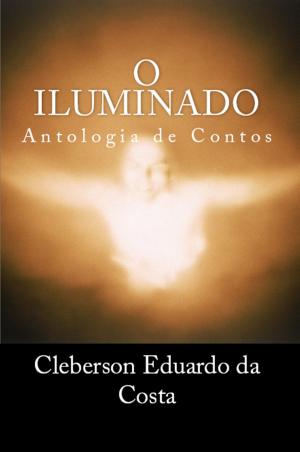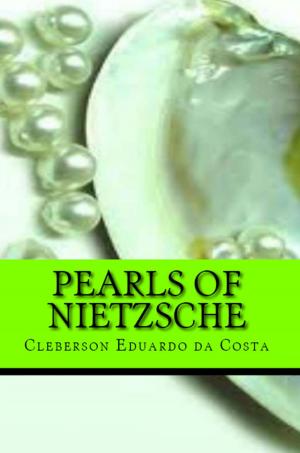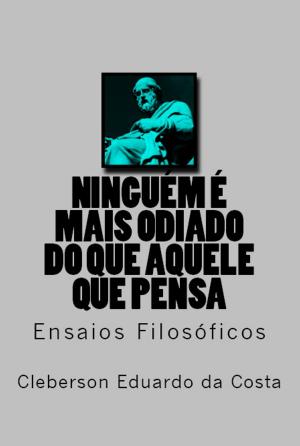HEGEL FOR TEACHERS
The philosopher of absolute knowledge
Nonfiction, Science & Nature, Science, Other Sciences, Reference, Philosophy & Social Aspects| Author: | CLEBERSON EDUARDO DA COSTA | ISBN: | 1230001514001 |
| Publisher: | ATSOC EDITIONS - EDITORA | Publication: | January 20, 2017 |
| Imprint: | 1 | Language: | English |
| Author: | CLEBERSON EDUARDO DA COSTA |
| ISBN: | 1230001514001 |
| Publisher: | ATSOC EDITIONS - EDITORA |
| Publication: | January 20, 2017 |
| Imprint: | 1 |
| Language: | English |
(A5,150 P.)
I
Why Hegel for teachers, the so- called philosopher of absolute knowledge?
I say to you:
The philosophy of Hegel (1770-1831) from the 20th century has experienced and still today - Dawn of the 21st century - has experienced a great revival, and this fact was and is, in large part, the four important reasons:
Because Hegel was rediscovered and re-evaluated as progenitor of the philosophy of Marxism (and not only by Marxist philosophical orientation);
Because the historical perspective (of quest for knowledge) that Hegel put in everything, in a general sense, as well as Karl Marx, also influenced:
The philosophy of Foucault (1926-1984), with your method called archaeological value;
The philosophy of Nietzsche (1844-1900), with its "genealogy of morality" and with the so- called "theory of the three transformations of spirit" (the camel, the lion and the child);
The philosophies of Sartre and Heidegger, with their existencialism different, and also of others;
Because, at the time, and even more so today has been a growing recognition of the importance of their pleas epistemological (phenomenological, under the foundations of your idealism dialectical) to search for knowledge.
Because important philosophers (Georg Lukács, Herbert Marcuse, Theodor Adorno, Ernst Bloch, Alexandre Kojève and Gotthard Günther) were, and others, even today, have been responsible directly and indirectly by the rebirth of Hegel, putting in evidence the foundations of epistemological philosophy or Phenomenology of Spirit.
II
However, in the same way, no philosopher was and/or has been so badly translated or interpreted as Hegel. His philosophy was in many cases distorted account of tragic way, and until today, due to this reason, has been misunderstood or poorly understood by many, mostly teachers. That is, many who talked about Hegel did not know what they were talking or knowing what they were talking, they didn't know correctly him talking. Certainly this is due to the fact, for having been criticized and pejoratively called idealistic by philosophers like Feuerbach, Karl Marx (1818-1883), Friedrich Engels and others, have also been on the same track, placed historically on condition of conservative thinker, pre-deterministic as Plato, Descartes and many others, i.e., placed in a condition:
Of preserver of social injustices or the status quo;
Of non-revolutionary.
III
What we can say, however, that if you see throughout this work is that the dialectical idealism of Hegel, although the same designs nature as being the manifestation of pure idea, in much if it differs from idealisms of classical thinkers such as Plato and modern as Descartes, since, according to him, Hegel, the ideas pure, giving rise to the nature, are not unchangeable, because the being is conceived by him as future (likely to be), and the truth, within this context, it is understood as something historic, i.e., as what is shown dialectically in time. This is Hegel, without a shadow of a doubt, epistemologically speaking, gave qualitative leaps in relation to all other philosophers, and not only those considered idealists.
IV
Even Karl Marx and Engels), as we all know, radical critic of Hegel, to develop its dictates materialist philosophy dialectics, it’s called "materialist dialectics of history", if not the copied (plagiarism), was very little original in relation to it, since only reversed the philosophical conception of the same, to, for example, defending the idea that the dialectical process starts from the field (nature) and not the idea pure, i.e., developed virtually the same epistemology of Hegel and, at the end, just codified it backwards. This is, I think that Karl Marx read both Hegel who used in reverse the dialectical idealism of Hegel in databases materialistic and economic.
V
Has not, here, however, the goal of confronting or compare the philosophies of Marx and Hegel, since it is believed that the ideas of the first are already too widespread and well known not only in academia, but also in the universe of different groups called socialist or capitalist around the world.
It is intended, here, in Unit I, just talk and/or studying, the more thoroughly and, at the same time, didactics possible, the ideas of this great philosopher who was Hegel, i.e., seeking a better understanding of the essence of his philosophy, as well as their important contributions to metaphysics, in a general sense, and the epistemology, under the foundations of its phenomenology of spirit, in specific direction.
In Unit II, we will bring to the fore a thorough and careful relationship between the main axioms of Hegel, in line with the themes developed in Unit I, aiming at a further study. From the unit III, we present other essays, discussing philosophical issues .
Hopefully, this book, in some way, can contribute to the formation of a freer society, because more autonomous, intellectually speaking and, in the same way, more equitable, democratic, ethics and fair, because also politically more participatory.
(A5,150 P.)
I
Why Hegel for teachers, the so- called philosopher of absolute knowledge?
I say to you:
The philosophy of Hegel (1770-1831) from the 20th century has experienced and still today - Dawn of the 21st century - has experienced a great revival, and this fact was and is, in large part, the four important reasons:
Because Hegel was rediscovered and re-evaluated as progenitor of the philosophy of Marxism (and not only by Marxist philosophical orientation);
Because the historical perspective (of quest for knowledge) that Hegel put in everything, in a general sense, as well as Karl Marx, also influenced:
The philosophy of Foucault (1926-1984), with your method called archaeological value;
The philosophy of Nietzsche (1844-1900), with its "genealogy of morality" and with the so- called "theory of the three transformations of spirit" (the camel, the lion and the child);
The philosophies of Sartre and Heidegger, with their existencialism different, and also of others;
Because, at the time, and even more so today has been a growing recognition of the importance of their pleas epistemological (phenomenological, under the foundations of your idealism dialectical) to search for knowledge.
Because important philosophers (Georg Lukács, Herbert Marcuse, Theodor Adorno, Ernst Bloch, Alexandre Kojève and Gotthard Günther) were, and others, even today, have been responsible directly and indirectly by the rebirth of Hegel, putting in evidence the foundations of epistemological philosophy or Phenomenology of Spirit.
II
However, in the same way, no philosopher was and/or has been so badly translated or interpreted as Hegel. His philosophy was in many cases distorted account of tragic way, and until today, due to this reason, has been misunderstood or poorly understood by many, mostly teachers. That is, many who talked about Hegel did not know what they were talking or knowing what they were talking, they didn't know correctly him talking. Certainly this is due to the fact, for having been criticized and pejoratively called idealistic by philosophers like Feuerbach, Karl Marx (1818-1883), Friedrich Engels and others, have also been on the same track, placed historically on condition of conservative thinker, pre-deterministic as Plato, Descartes and many others, i.e., placed in a condition:
Of preserver of social injustices or the status quo;
Of non-revolutionary.
III
What we can say, however, that if you see throughout this work is that the dialectical idealism of Hegel, although the same designs nature as being the manifestation of pure idea, in much if it differs from idealisms of classical thinkers such as Plato and modern as Descartes, since, according to him, Hegel, the ideas pure, giving rise to the nature, are not unchangeable, because the being is conceived by him as future (likely to be), and the truth, within this context, it is understood as something historic, i.e., as what is shown dialectically in time. This is Hegel, without a shadow of a doubt, epistemologically speaking, gave qualitative leaps in relation to all other philosophers, and not only those considered idealists.
IV
Even Karl Marx and Engels), as we all know, radical critic of Hegel, to develop its dictates materialist philosophy dialectics, it’s called "materialist dialectics of history", if not the copied (plagiarism), was very little original in relation to it, since only reversed the philosophical conception of the same, to, for example, defending the idea that the dialectical process starts from the field (nature) and not the idea pure, i.e., developed virtually the same epistemology of Hegel and, at the end, just codified it backwards. This is, I think that Karl Marx read both Hegel who used in reverse the dialectical idealism of Hegel in databases materialistic and economic.
V
Has not, here, however, the goal of confronting or compare the philosophies of Marx and Hegel, since it is believed that the ideas of the first are already too widespread and well known not only in academia, but also in the universe of different groups called socialist or capitalist around the world.
It is intended, here, in Unit I, just talk and/or studying, the more thoroughly and, at the same time, didactics possible, the ideas of this great philosopher who was Hegel, i.e., seeking a better understanding of the essence of his philosophy, as well as their important contributions to metaphysics, in a general sense, and the epistemology, under the foundations of its phenomenology of spirit, in specific direction.
In Unit II, we will bring to the fore a thorough and careful relationship between the main axioms of Hegel, in line with the themes developed in Unit I, aiming at a further study. From the unit III, we present other essays, discussing philosophical issues .
Hopefully, this book, in some way, can contribute to the formation of a freer society, because more autonomous, intellectually speaking and, in the same way, more equitable, democratic, ethics and fair, because also politically more participatory.















